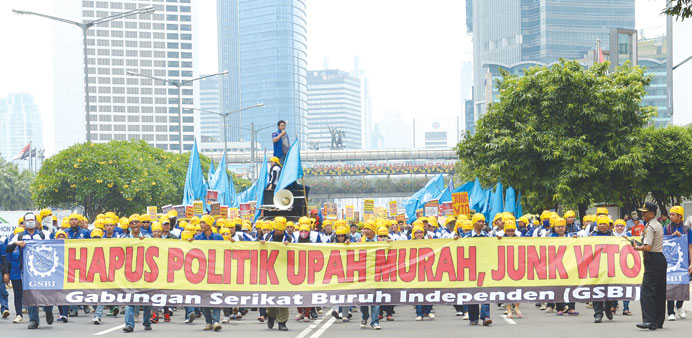The picture taken in Jakarta on November 12 shows Indonesian workers holding a protest against WTO, marching from the Japanese embassy to the presidential palace in Jakarta. New WTO chief Roberto Azevedo will be seeking to defy the odds and push through an agreement that could lead to relaunching the “Doha Round” of talks on slashing world trade barriers.
AFP
The WTO meets for a crunch summit in Indonesia this week billed as a do-or-die attempt to salvage an elusive deal on global commerce and, with it, the 159-member trade body’s own relevance.
New WTO chief Roberto Azevedo will be seeking to defy the odds and push through an agreement that could lead to relaunching the “Doha Round” of talks on slashing world trade barriers.
But hopes for success are low after the WTO failed to agree on even a modest deal to put to trade ministers who will open the four-day gathering on the island of Bali tomorrow.
At stake is the future of trade multilateralism as regional pacts are increasingly favoured by major trading nations, such as the Asia-Pacific-focused Trans-Pacific Partnership (TPP) pushed aggressively by Washington, analysts said.
Sergio Marchi, Canada’s past trade minister and former WTO envoy, said “failure in Bali will be very unkind to the WTO after 12 years of missed deadlines and opportunities” on the Doha Round.
“There will be a high cost to its credibility and relevance,” he said.
Launched in 2001, the Doha Round aims for a wide-ranging accord to open markets and remove trade barriers, with a focus on helping poorer countries.
Azevedo, Brazil’s former trade envoy who took the WTO helm in September, has cited some estimates saying it could provide a $1tn boost to global commerce.
But the talks have stalled repeatedly as rich countries, emerging powers such as China and India, and the world’s poorest nations spar over the give and take needed to craft a deal.
The World Trade Organisation’s requirement that deals be unanimously agreed by all members also has complicated matters.
Negotiators had long ruled out major progress in Bali, instead working on lower-level thematic accords that could be fed into a wider package later.
But despite an intense push by Azevedo and signs that diplomats were coming tantalisingly close on those accords, negotiations in Geneva stumbled last week over issues including food security and customs procedures.
WTO diplomats engaged in last-ditch talks last Thursday however hailed a “breakthrough” on simplifying customs measures to facilitate trade, indicating that poor countries would be given extra flexibility to implement new rules under discussion.
But other gaps remain, and analysts warn that a limited agreement in Bali might do little to revive Doha Round anyway.
The WTO chief urged trade ministers to make a final push in Bali to get a deal “over the line” and has worked the phones in the run-up to the summit to try to bridge those gaps.
But after years of WTO failure on the Doha Round, regional pacts with fewer members are in the ascendancy.
Deals like the 12-member TPP—which has hit negotiating hurdles of its own—have been criticised, however, for tending to leave out poorer economies, as opposed to the WTO.
The US showed its low regard for the WTO last week in Geneva when it resisted an Indian proposal on food security, said Kevin Gallagher, an expert on globalisation and development at Boston University.
The proposal would have allowed developing countries to subsidise grain stockpiles to help low-income farmers and consumers, but critics said such stocks could have ended up on the market, skewing trade.
“By dumping the WTO unless it accedes in full to US demands, the US—despite all its rhetoric in favour of multilateral approaches—makes plain its intention to focus on trade treaties like the Trans-Pacific Partnership,” Gallagher wrote in an opinion piece to be published in several emerging market newspapers.
However the Indian government may have also “hardened its stand” due to domestic concerns, making it more difficult to reach a compromise, said Pradeep Mehta, an Indian former adviser to the WTO.
The ruling Congress party, which faces general elections by May 2014, fears that any agreement reached at the WTO on the issue could interfere with a landmark food subsidy programme which it views as a key vote-getter.
Failure in Bali may relegate the WTO to the role of merely settling disputes between its members, observers say.
Some such disputes could loom on the sidelines in Bali, including a bitter row between Russia and the European Union over car import duties imposed by Moscow.

